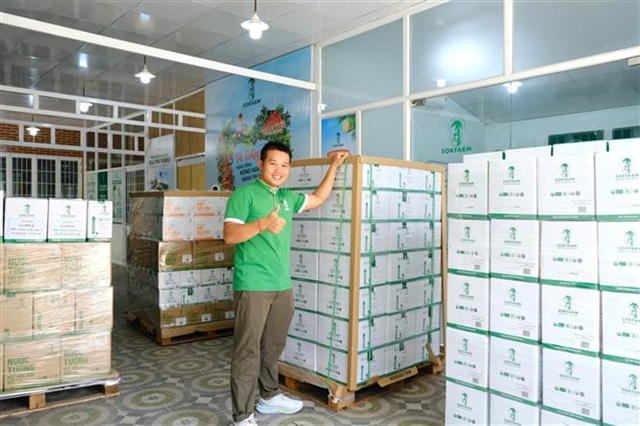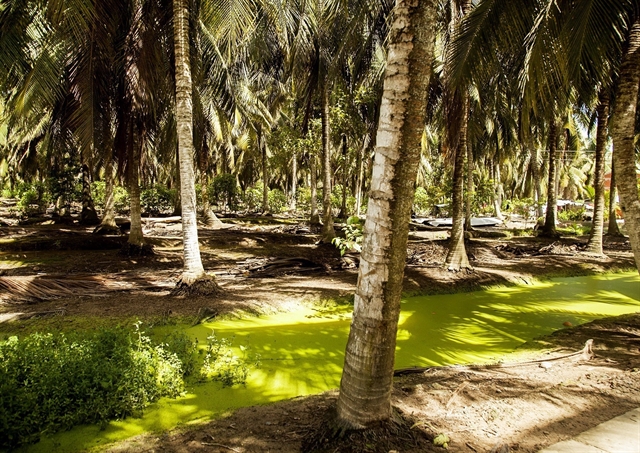 Economy
Economy

 |
| An organic coconut orchard in Thạnh Phú District in Bến Tre Province. — VNA/VNS Photo Hồng Đạt |
BẾN TRE — Bến Tre Province aims to expand its organic coconut growing area to boost exports and increase farmers’ incomes.
As the country’s largest coconut producer, the Cửu Long (Mekong) Delta province has more than 80,000ha under coconut, or nearly 42 per cent of the country’s total.
Đoàn Văn Đảnh, director of the province's Department of Agriculture and Rural Development, said over 20,400 ha produce organic coconut.
To expand organic coconut growing areas, the department would enhance advocacy for support policies aimed at producing agricultural products within value chains, he said.
It would focus on implementing the province’s 2022-25 plan to develop organic agriculture.
The province has developed linkages between organic coconut farmers and eight large companies with high-tech processing facilities.
These companies export coconut products to various markets, including the US, EU, Japan, China, Canada, and South Korea.
Coconut is the province’s key industrial crop and a major source of income for over 200,000 households.
The area under coconut has been increasing steadily in recent years as many farmers have converted unproductive lands previously used for growing rice and other crops into coconut orchards.
The Ministry of Agriculture and Rural Development has approved a plan to designate coffee, rubber, tea, cashew, pepper, and coconut as key industrial crops for the period until 2030.
Huỳnh Quang Đức, deputy director of the department, said his agency would work with relevant agencies and localities to advocate for assigning coconut key status in the province’s development plans for industrial crops.
He said the province has identified coconut as its key tree, recognising its multi-use value and high export potential.
It has designated 133 coconut growing areas covering 8,391 ha with production codes, primarily in Giồng Trôm, Châu Thành, Ba Tri, Bình Đại, and Mỏ Cày Bắc districts and Bến Tre City.
It has 14 companies that have been granted packaging codes for exporting tender coconuts to China.
Việt Nam exports 26.7 million tender coconuts to 14 countries annually.
Bến Tre xiêm xanh coconut, a variety for drinking the juice, has been granted a geographical indication by the National Office of Intellectual Property.
The province also produces a variety of coconut-based products such as smokeless coconut shell charcoal, oil, coconut fibre mattress, and handicrafts.
It has support policies to assist farmers, co-operatives, co-operative groups, and companies in renovating coconut orchards and transitioning to organic methods and production codes.
In 2024, it organised 105 training courses to teach farmers techniques for growing tender coconuts for export, producing organic fertilisers and managing coconut pests.
Nguyễn Văn Đoàn, who owns a 3.5-hectare organic coconut orchard in Thạnh Phú District’s Thới Thạnh Commune, said that by producing organic fertilisers for his orchard, he can save VNĐ30-35 million (US$1,200-1,400) in chemical fertiliser costs annually.
He harvests around 3,000 coconuts per month, generating an income of VNĐ20-30 million ($800-1,200).
He also raises giant river prawns in the orchard’s ditches, earning an additional VNĐ200 million ($7,900) annually from them.
The province encourages farmers to join co-operatives and co-operative groups to grow organic coconuts and expand growing areas.
There are 66 co-operative groups and co-operatives with a total of 7,048 members and 10,094 ha of organic coconuts and value chains for their products.
The province has helped growers improve product quality and develop linkages with various stakeholders for growing, processing and selling coconut products.
It has assisted companies in renovating production technologies, implementing trade promotion and developing brand names for their products.
It has provided knowledge about the requirements of import markets and technical solutions to ensure farmers and companies meet them.
It has strengthened trade promotion activities, improved the connections between supply and demand, and supported companies in participating in domestical and international fairs and exhibitions. — VNS




